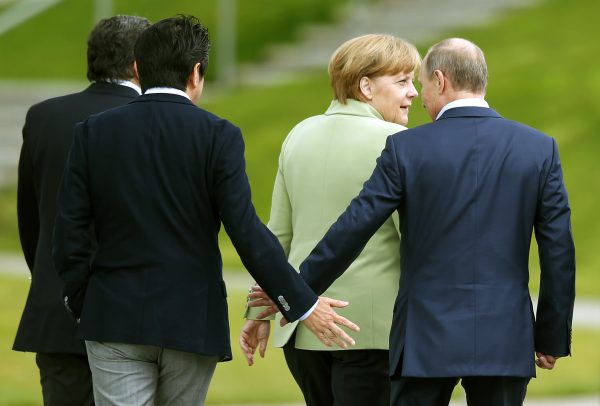The Russian leader will meet his Japanese counterpart, Prime Minister Shinzo Abe, in Nagato, Yamaguchi prefecture, before participating in an economic forum in Tokyo the following day.
A visit by the Russian head of state is always a significant event. But on this occasion the sense of anticipation surrounding the meeting is especially high due to Prime Minister Abe’s announcement of a ‘new approach’ to relations with Russia. This policy was unveiled during Abe’s visit to Sochi in May and proposes increased economic cooperation in eight key areas. Abe’s underlying aim is to demonstrate the value of relations with Japan and thereby induce concessions from Russia on the countries’ territorial dispute.
The disagreement relates to a group of islands known as the Southern Kuril Islands in Russian (Northern Territories in Japanese), which were seized by the Soviet Union at the end of World War II. This dispute has prevented the signing of a peace treaty ever since. There are now hopes that this might be achieved via Abe’s ‘new approach’. The Japanese leader raised expectations in May by telling reporters, ‘I have a sense that we are moving towards a breakthrough in the stalled peace treaty negotiations’.
Will Putin’s December visit therefore be the moment when a territorial deal is finally reached? 2016 has been a year of surprises, with both the Brexit vote and Trump’s election showing the weaknesses of political forecasting. I nonetheless risk another prediction here: the Yamaguchi summit will not deliver a major breakthrough in Japan–Russia relations.
Prime Minister Abe takes a more flexible attitude to the territorial dispute than many of his predecessors. He recognises the impossibility of regaining all four islands and is therefore willing to compromise. Abe’s plan seems to be to achieve the return of the two smaller islands (Shikotan and Habomai), plus to agree on continued talks about the status of the larger islands of Iturup and Kunashir (Etorofu and Kunashiri in Japanese). Although Abe understands that subsequent negotiations would be unlikely to lead to the return of any more territory, this deal would enable him to maintain that he has not abandoned Japan’s claim to all four islands.
Believing that this proposal represents significant concessions from the Japanese side and convinced that Russia needs Japan’s economic assistance, the Abe administration has persuaded itself that this deal is viable. Yet in reality, Russia has never indicated any willingness to go beyond an agreement to transfer the two smaller islands after the signing of a peace treaty that conclusively settles the dispute. This is the offer that was made in the 1956 Soviet–Japanese Joint Declaration.
Throughout this year, the Russian leadership has made it clear that it will not be induced into further concessions. For instance, just prior to meeting Abe in Vladivostok in September, Putin publicly stated, ‘we don’t trade in territories’. The following month, he also replied to a question about the peace treaty by saying, ‘When this will be done, how it will be done or whether it will be done at all — I cannot say right now’. A further sign that a breakthrough will not be forthcoming is that no efforts have been made in the Russian state-controlled media to prepare public opinion for territorial concessions.
There are also indications that Putin may not even be willing to fully give up the two smaller islands. At the G20 summit in September, Putin told journalists that the 1956 Joint Declaration does ‘not state on what conditions this handover is to take place, and who has sovereignty afterwards’. This seems to suggest that, while Abe is hoping for ‘two islands plus’, meaning Shikotan and Habomai plus continued talks about Etorofu and Kunashiri, Putin is thinking of ‘two islands minus’, meaning that Japan would not even gain unconditional control over Shikotan and Habomai.
Finally, there are questions about the significance that Russia attributes to relations with Japan. The Kremlin would undoubtedly like increased economic ties and welcomes the opportunity to highlight divisions within the G7. Yet the Russian leadership does not seem to regard Japan as a country of such importance that it would be worth sacrificing territory to secure closer cooperation. For instance, in Russia’s new Foreign Policy Concept, which was approved on 30 November 2016, Japan is listed not only after China and India, but also after Mongolia.
The Yamaguchi summit seems set to disappoint. This was seemingly acknowledged in Abe’s downbeat comments after meeting Putin on the sidelines of APEC in November. But the visit will not be a complete failure. The two countries will likely sign a series of documents on economic cooperation. There may also be an announcement on security ties, such as the restart of ‘2+2’ talks between the countries’ foreign and defence ministers.
Putin wants bilateral economic cooperation to continue so will likely offer some vague words that keep Japanese territorial hopes alive and encourage the view that a deal may be possible in future if bilateral relations become sufficiently close. After such high hopes for Putin’s visit, a lack of progress on the territorial issue will be a source of frustration for many in Japan.
James D. J. Brown is an Associate Professor of political science at Temple University, Japan Campus.


Even if a deal of sorts is done ‘the devil will be in the details.’ As noted, will Japan actually be accorded sovereignty over the two small islands? Will it have rights for placing military/SDF troops on the islands? What kind of economic assistance will it give Russia? By doing so would Abe undermine the sanctions put in place after the Ukraine incidents?